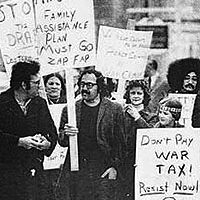CHICAGO — “I can’t believe that seniors citizens have got to go through this mess,” Anna said to me as we stood in line for a flu shot early Monday morning out side the Atlas Center for the Aging here.
“This is horrible,” she added as adjusted the oxygen lines to her nose. “I don’t believe it.”
Anna and I were part of the several hundred elderly who were waiting to get a flu shot a little after 7 a.m. on Oct. 11 on the city’s South Side. There was a short line ahead of us and a much longer one behind. It was chilly and we could see our own breath.
Standing in line were many elderly holding on to their walkers and canes, some doubled over by age and who shuffled as they moved around. A number of people brought folding chairs, not knowing how long they would have to stand.
There wasn’t a kind word to be said about the Bush administration and the flu shot crisis among people I talked to around me. There were just sounds of disgust and angry words.
Later that day President Bush and his spokespersons tried to blame the shortage on the vaccine manufacturers, including the U.S.-owned Chiron Corp., and chided Democrats and others for “scaring people” about the shortage of shots. Vice President Cheney said the shortage was due to a “limited profit margin” on vaccines and drug company fears of lawsuits.
Yet doctors and independent health care professionals said there have been signs of a potential shortage of flu vaccines for several years. They noted the U.S. relies on only two suppliers to provide flu vaccines for the U.S. market, one of them Chiron. Half the country’s supply, about 47 million doses, were lost when Chiron’s vaccines were declared defective.
In contrast, Britain orders flu vaccines from five different suppliers, thereby hedging its bets should one or more of its suppliers fail to deliver.
At one point last week, Bush said he was “working with Canada to hopefully produce the (flu) vaccine,” leading to charges of a dramatic Bush flip-flop. Referring to the president’s stance against importing lower-priced drugs from Canada, Ed Coyle, head of the Alliance of Retired Americans, said, “It’s hard to accept the president’s logic that it’s safe to get Canadian-imported flu vaccines, but somehow unsafe to import other necessary medicines from Canada.”
The U.S. flu vaccine shortage has also led to charges of price gouging by some vendors and the arbitrary, unfair distribution doses on hand.
One response to the country’s pending crisis came Oct. 11 from a meeting of the American College of Emergency Physicians, whose leaders urged Bush to convene a “crisis summit” on how to handle an increase in flu from those who are not able to get a flu shot.
At a press conference, Dr. Arthur Kellerman said, “We believe our nation faces the potential for a public health disaster this flu season. … We could have a situation where people are dying in the waiting room and dying in the hallways” if action is not taken.
Each year influenza claims the lives of 36,000 people in the U.S. and sends about 200,000 to the hospital. The people most at risk are the very old, the very young, or people with chronic illnesses. With increasing numbers of people losing their health insurance and going without needed checkups, many will sure be in a weakened physical condition this season, a condition that will make them more susceptible to getting the flu.
Phil E. Benjamin contributed to this story.












Comments